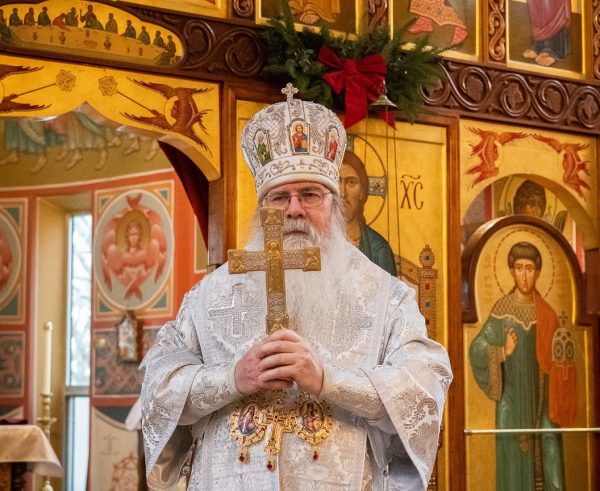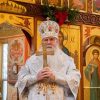On Sunday, August 9, the Feast Day of Saint Herman of Alaska, and the 50th anniversary of his glorification, His Beatitude Metropolitan Tikhon celebrated the Divine Liturgy at the Monastery of the Holy Transfiguration, Ellwood City, PA. During the course of the Divine Liturgy, Metropolitan Tikhon ordained Subdeacon John Thetford, Chancery Assistant, to the Holy Diaconate.
His Beatitude offered the following word to the faithful:
Let me first extend my greetings to His Eminence Archbishop David of Sitka and Alaska, and to the faithful who are making the annual pilgrimage to Spruce Island for the feast of Saint Herman of Alaska today. My dear brother, beloved children in the Lord, may God preserve you as you journey from Kodiak to Spruce Island in the various boats and ships that will take you there. I long to be with you, eagerly catching a glimpse of Monk’s Lagoon from the boat, to make my way up the well-trodden path to the Chapel of Saints Sergius and Herman of Valaam, and there to celebrate the festal Divine Liturgy with you to the glory of God and in honor of the heavenly patron of our Church.
The precautionary measures and safety protocols put in place because of the current pandemic prevent me from being with you in person, but know that I am with you in Christ. Indeed, know that you are not alone, but all the faithful of the Orthodox Church in America are with you. You are there, we are here, but we are one Church, one body, united in faith in our risen Lord. You are on pilgrimage to Spruce Island, and we join you in a common pilgrimage on this earth to the Kingdom of Heaven. Please pray for us at this sacred shrine of the Orthodox Church in America.
Right now, all of us throughout the Church are confronted by so many different things vying for our attention: the coronavirus, political strife, civil unrest, economic anxiety. Each of these things by themselves could consume us with worry and anxiety. But as Christians, what can we do in response to any or all of them? We could be sore tempted to respond in the spirit of this age with vitriol, demands, anger, hatred, enmity, tribalism, in pride, and self-justifications. None of these seem appropriate in the context of our sacred gathering today.
Indeed, the annual pilgrimage that our brothers and sisters are making to Spruce Island serves as reminder of a basic truth of our lives as Christians, and thus provides an initial response to everything currently going on around us: we are but pilgrims, sojourners on this earth, moving, working, yearning for the Kingdom of Heaven. We live in this world, in this country without political affiliation or secular identity, because our citizenship and identity are with the Kingdom to come. Understanding this, our place in this world does not free us from what worries us, what causes us anxiety, what vexes us, but it strengthens us so that we are able to endure this present age.
The sacred scriptures read this morning present each of us with a clear vision of the path of this earthly pilgrimage: it is precisely over turbulent seas and wind. Christ beckons us to come to him in the raging wind and tempest, and reveals himself to us in them. As he stands in the midst of the turbulent seas described in the Gospel today, calling us to him, he shows that he is not only the goal of pilgrimage, but he also accompanies us along the way. The waves and the wind frightened the disciples and Peter, but Christ extended his hand, gave peace to them, encouraged them, strengthened them, and bid them to come to him. When Peter’s faith failed amidst the crashing of the waves, Christ did not fail, did not turn angry, did not disappoint, but received Peter, calmed the seas, and revealed a great mystery to his disciples and to us.
We should strain forward and perceive this mystery further, because it helps us further understand our pilgrimage. And the mystery revealed to us is this: Christ is the Lord of all, he commands the waves and the sea and the winds, but, even more, as Lord of all, he has compassion. He has love. When Peter, in a moment when his faith waivered, called upon the Lord to save him, our Lord saved him out of his compassion, goodness, and love. This revelation, that Christ is the Lord of all and he loves us, allows the disciples and us to perceive more profoundly who Christ is, “truly,” they say, “Thou art the Son of God.”
This theophany on the water is reminiscent of the great feast of the Transfiguration that we have just celebrated, where our Lord again reveals himself to his disciples. Far from the waters of the lake in the Gospel today, high on Mt. Tabor, the glory of the Lord shone brightly. Instead of the voices of the disciples in the boat, here on the high mountain, the Eternal Father testified clearly to who exactly “this man” is, who commands the waves of the sea and the mighty wind. It is the Beloved Son of the Almighty God.
Now, we should note well what is clear: the light of Tabor, the transfiguration on the mount, the miracle on the stormy waters from the Gospel today all reveal to us one and the same ancient mystery: our God is “merciful and gracious, slow to anger, and abounding in steadfast love and faithfulness (Ex 34.6).” He has revealed this to us in the person of his Son, Jesus Christ. He has revealed this to us today for our consideration – the light of Tabor, the miracle on the water – out of love and faithfulness.
He could have left himself hidden and shrouded in obscurity, and remained unknown to us, and we would thus be deprived of knowing him as our beloved. But instead he has shown himself to us, revealed himself to us out of his goodness, and through this knowledge, our faith is strengthened and renewed, and we enter more profoundly into a relationship, into life with our heavenly God. With faith in him, we are able to pass through the many storms of this life. In his presence, which we arrive at through knowledge and faith in him, the waters and the wind, the cares and tumult of this world, become calm. And, like Peter, if our faith waivers, our Lord, true to his revelation, is not provoked to anger, but, in fact, draws closer to us.
And there is yet one further manifestation of the glory of God for us today, namely, Saint Herman of Alaska, whom we celebrate today. With him, it is testified that the glory of God engages in the life of men and women of this earth in times reminiscent of our own, in places known to us. That Saint Herman walked like Peter upon the waves and winds of this world in full faith through faith in Jesus Christ is well known to us. By faith, he endured labors, hardships, hunger, isolation, and deprivations of every kind, but through this great tumult he remained fixed on following the Lord. That Saint Herman lived a life illumined by and sharing in the light that shone on Mt. Tabor at the Transfiguration, is evident to all through the love, compassion, mercy he showed to all whom he encountered in Alaska. So great is his love for the people of Alaska that to this day the faithful speak of him as a living, abiding, comforting presence in their lives.
So now it is up to us to receive these great revelations of the glory of God in the person of Jesus Christ and become transformed by the light of Mt. Tabor, and transfigured by the miracle on the waters of the unnamed lake in the Gospel today. We can be transformed and transfigured today by coming to know evermore Jesus Christ through the knowledge given over to us in the words of scripture, the reception of the holy gifts, and through the testimony of the life of Saint Herman of Alaska, whom we honor today. Above all, therefore, what has been revealed to us in so many ways today is that we live in this world ever moving forward as pilgrims to the Kingdom of Heaven in faith and love, and not by any other means.
Through the prayers of Saint Herman, may the light of Tabor shine out of us also as we show love and compassion to all we encounter; and may our pilgrimage here on earth continue towards the Kingdom of Heaven, where our Lord awaits us, beckoning us to come unto him in faith, now and unto the ages of ages. Amen.
















